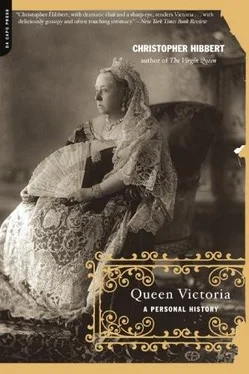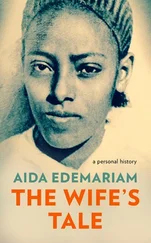Christopher Hibbert - QUEEN VICTORIA A Personal History
Здесь есть возможность читать онлайн «Christopher Hibbert - QUEEN VICTORIA A Personal History» — ознакомительный отрывок электронной книги совершенно бесплатно, а после прочтения отрывка купить полную версию. В некоторых случаях можно слушать аудио, скачать через торрент в формате fb2 и присутствует краткое содержание. Жанр: Биографии и Мемуары, на английском языке. Описание произведения, (предисловие) а так же отзывы посетителей доступны на портале библиотеки ЛибКат.
- Название:QUEEN VICTORIA A Personal History
- Автор:
- Жанр:
- Год:неизвестен
- ISBN:нет данных
- Рейтинг книги:5 / 5. Голосов: 1
-
Избранное:Добавить в избранное
- Отзывы:
-
Ваша оценка:
- 100
- 1
- 2
- 3
- 4
- 5
QUEEN VICTORIA A Personal History: краткое содержание, описание и аннотация
Предлагаем к чтению аннотацию, описание, краткое содержание или предисловие (зависит от того, что написал сам автор книги «QUEEN VICTORIA A Personal History»). Если вы не нашли необходимую информацию о книге — напишите в комментариях, мы постараемся отыскать её.
QUEEN VICTORIA A Personal History — читать онлайн ознакомительный отрывок
Ниже представлен текст книги, разбитый по страницам. Система сохранения места последней прочитанной страницы, позволяет с удобством читать онлайн бесплатно книгу «QUEEN VICTORIA A Personal History», без необходимости каждый раз заново искать на чём Вы остановились. Поставьте закладку, и сможете в любой момент перейти на страницу, на которой закончили чтение.
Интервал:
Закладка:
lvii
She caused much consternation in the household in 1895 - after her marriage had broken down - by her relationship with Sir Arthur Bigge who succeeded Sir Henry Ponsonby as the Queen's Private Secretary in May that year. Princess Beatrice sent for Dr Reid in November 'to speak about Princess Louise's relations with Bigge and said that it was a scandal and something must be done. The Princess of Wales had written to her about it. Also Princess Christian, she said, was much exercised about it. Lady Bigge was in despair; she had ruined the happiness of others and would his. Prince Henry had seen Bigge drinking Princess Louise's health at the Queen's dinner. She had him in her toils. If the Queen knew all she would not keep Bigge.' It was over two years before the scandal finally subsided and relations between Princess Beatrice and Princess Louise improved at last (Michaela Reid, Ask Sir James: The Life of Sir James Reid, 102-4).
lviii
The Queen, in contrast, so Mary Ponsonby observed, was often more at ease with servants than with her guests, as the Prince Consort had also been. She would, she herself said, just as soon clasp 'the poorest widow in the land to her heart as she would any lady in high position'. Differences in rank must, of course, be supported; but one could never be 'sufficiently loving, kind and considerate to those beneath one'.
lix
She almost never forgot an anniversary herself. Her granddaughter, Princess Marie Louise, recalled how she invariably wore lockets containing mementoes of various members of her family on their birthdays: 'Her bracelets were gold chains from which hung various lockets containing the hair of her children and grandchildren ... On birthdays and other family anniversaries, any special brooches or other pieces of jewellery given to her in commemoration of these events were always worn on the day itself (Princess Marie Louise, My Memories of Six Reigns, 141).
Every year, from 1861 onwards, the anniversary of the Prince Consort's death was for her a day of mourning.
'This sad day,' she was to write a few weeks before her own death, 'so full of terrible memories, returned again.' The anniversary of his birth was always remembered and commemorated, too. 'This ever dear day has returned again without my beloved Albert being with me, who on this day, eighty one years ago, came into the world as a blessing to so many, leaving an imperishable name behind him,' she was to record in her journal on the last anniversary she was to live to see. 'How I remember the happy day it used to be, and preparing presents for him, which he would like ... All, all is engraven on my mind and in my heart!' (Queen Victoria's Journal, 26 August 1900).
lx
Prince Arthur, who was created Duke of Connaught and Strathearn in 1874, was eventually promoted to field-marshal, but never achieved his ambition of becoming commander-in-chief, much to his mother's annoyance.
She cannot [she protested] and will not submit to the shameful principle that Princes are to suffer for their birth in a monarchical country. Have a Republic at once, if that is the principle. She must have an assurance that such is not the case. Arthur was recommended solely on account of his peculiar fitness . It is very abominable that the Government, and a so-called Conservative one too, should wish to pander to the Radicals! (Quoted in Kenneth Rose, Kings , Queens and Courtiers, 53)
lxi
In his book Albert and Victoria (London, 1972, 225) David Duff, citing 'private information', wrote, 'It has been passed down that he [Sir James Clark] revealed, to members of his own profession, the Queen's reply to his advice that she should have no more children. The reply was "Oh, Sir James, can I have no more fun in bed?"'
lxii
The silence of the Windsor corridors was often commented upon. 'It is quite remarkable, in fact almost uncanny, how quiet this enormous building is,' the Queen's German dresser, Frieda Arnold, wrote home in the 1850s, 'and sometimes one could imagine that the Castle was quite empty. For everyone goes about their business in the most calm and orderly fashion, and because of the carpets one hears nothing at all. People speak very quietly' (Benita Stoney and Heinrich C. Weltzien, My Mistress the Queen, 41).
lxiii
The Pension Wallis, a handsome building on three floors, was specially equipped for the Queen's visit with numerous items bought locally and entered in the Lord Chamberlain's 'Statement of Her Majesty's Expenses on Tour in Switzerland' - 'furniture, carpets, baths and sundries, glass, china, looking-glasses, a telegraphic apparatus and, to put Jenner's mind at rest, a prodigious amount of cleanser for the patent WC (Peter Arengo-Jones, Queen Victoria in Switzerland, 74).
lxiv
At Grasse she was a frequent guest at the estate of the immensely rich and awesomely imperious Alice Rothschild. One day while walking in the gardens she inadvertently strayed into a newly planted flower bed.' "Come off at once!" Baroness Rothschild thundered at the Queen of England and Empress of India.
'The Queen came off. After that she referred to Alice, perhaps only half in jest, as "The All-Powerful One". Their friendship endured. So did the epithet. "The Ail-Powerful One" became Alice's nickname to her kin' (Frederic Morton, The Rothschilds, 189).
lxv
The Queen had been far less impressed by Francesco Crispi, who had called upon her with the King and Queen of Italy when she had been staying at the Villa Palmieri in Florence in 1888. 'The King [Umberto I] is aged and grown grey [he was only forty-four], the Queen is as charming as ever. To my astonishment Signor Crispi, the present very Radical Prime Minister, came into the room, and remained there, which was very embarrassing ... They were most kind and amiable, making many excuses for Crispi's behaviour this morning — the King saying he was avery clever man, but had no manners' (Queen Victoria's Journal, 5 April 1888).
lxvi
Ten years before, she had written a letter of sympathy to the Duke of Cambridge on the death of his steward, which expressed her understanding of the grief that could be caused by the death of a trusted and devoted servant: 'Let me tell you how grieved I am at the great loss you have sustained in the loss of your faithful and excellent steward and I may add friend. No one perhaps can more truly appreciate your feelings than I do, who know what it is to have an attached, devoted and faithful confidential servant. Indeed such a loss is often more than those of one's nearest and dearest, for a faithful servant is so identified with all your feelings, wants, wishes and habits as really to be part of your existence and cannot be replaced' (FitzGeorge papers, 17 April 1873, quoted in Giles St Aubyn, The Royal George: A Life of George, Duke of Cambridge, 1963, 165).
lxvii
This portrait hung in Windsor Castle until, six days after his mother's death, King Edward VII had it removed and sent to Brown's surviving brother, William. It was kept at Crathic until 1944 when it was sold at auction for £4 12s. 6d. It was subsequently sold by Christie's in Edinburgh on 28 May 1998 to a private collector for £300,000 ('The Court Historian: Newsletter of the Society for Court Studies', vol. in, 2 July 1998, 65).
lxviii
There arc two portraits of Abdul Karim in the Durbar Corridor at Osborne which also contains a large collection of portraits of Indian dignitaries, soldiers, servants and of craftsmen who worked on the Durbar Room. All these were commissioned by the Queen who also commissioned the full-length portrait of the fifteen-year-old Maharajah Duleep Singh from F. X. Winterhalter. Impressed by the striking good looks of this boy who had been taken into British protection when his father was deposed, the Queen herself painted a portrait of him in watercolour, depicting him kneeling down to dress up Prince Arthur in Indian costume (Marina Warner, Queen Victoria's Sketchbook, 197-8). Thereafter Duleep Singh led a dissipated life for which he came to beg the Queen's forgiveness when she was staying at Grasse in 1891. 'The Queen said he was quite calm at first then wept bitterly imploring forgiveness and finally when she stroked his hand recovered his equanimity.' 'No wonder,' the Queen's maid-of-honour, Marie Adeane, commented, 'I believe he is a monster of the deepest dye and is treated far better than he deserves' (Victor Mallet, Life with Queen Victoria: Marie Mallet's Letters from Court, 48).
Читать дальшеИнтервал:
Закладка:
Похожие книги на «QUEEN VICTORIA A Personal History»
Представляем Вашему вниманию похожие книги на «QUEEN VICTORIA A Personal History» списком для выбора. Мы отобрали схожую по названию и смыслу литературу в надежде предоставить читателям больше вариантов отыскать новые, интересные, ещё непрочитанные произведения.
Обсуждение, отзывы о книге «QUEEN VICTORIA A Personal History» и просто собственные мнения читателей. Оставьте ваши комментарии, напишите, что Вы думаете о произведении, его смысле или главных героях. Укажите что конкретно понравилось, а что нет, и почему Вы так считаете.











